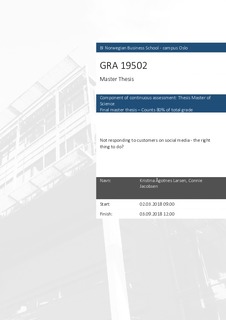Service recovery via social media
Master thesis
Permanent lenke
http://hdl.handle.net/11250/2579181Utgivelsesdato
2018Metadata
Vis full innførselSamlinger
- Master of Science [1621]
Sammendrag
Problem Service failure recovery has been researched for several years,
with research on social media starting to surface. However,
surprisingly little attention has been paid to a significantly larger
group than customers: the observers of complaints on social
media. Further, social media provides companies with new service
recovery options and companies can now choose to reply in a
vague and unhelpful manner or choose not to reply at all.
Therefore, this thesis investigates the impact unhelpful service
recovery versus no reply has on observers perceived fairness and
purchase intentions. We also consider complaint severity and
failure locus as moderators to the relationship.
Purpose The purpose of this thesis is to study the effect unhelpful service
recovery versus no reply has on observers purchase intentions,
while moderated by failure severity and locus, and mediated by
perceived fairness.
Research
Design
This thesis uses a scenario-based experiment with a betweensubjects
design to answer the problem statement. The study takes
a 2 (mere apology, no reply) X 2 (severity: high, low) X 2 (locus:
company, external) design.
Findings Not replying is proven to be better in terms of observers’ perceived
fairness and observers purchase intentions in all considered
scenarios. Failure severity and locus is also found to have a direct
effect on observers perceived fairness and an indirect effect on
observers purchase intentions via perceived fairness.
Keywords Service recovery, social media, observers, unhelpful service
recovery, failure severity, failure locus, perceived fairness
Beskrivelse
Masteroppgave(MSc) in Master of Science in Strategic Marketing Management - Handelshøyskolen BI, 2018
